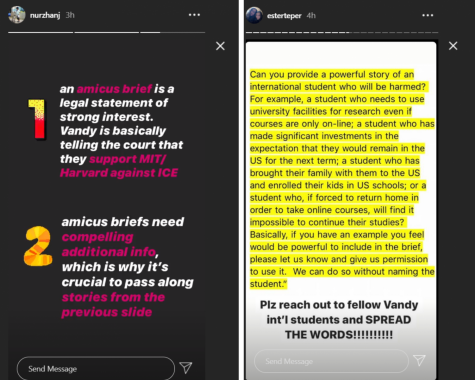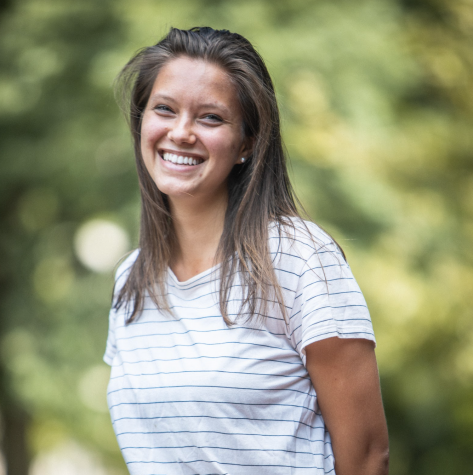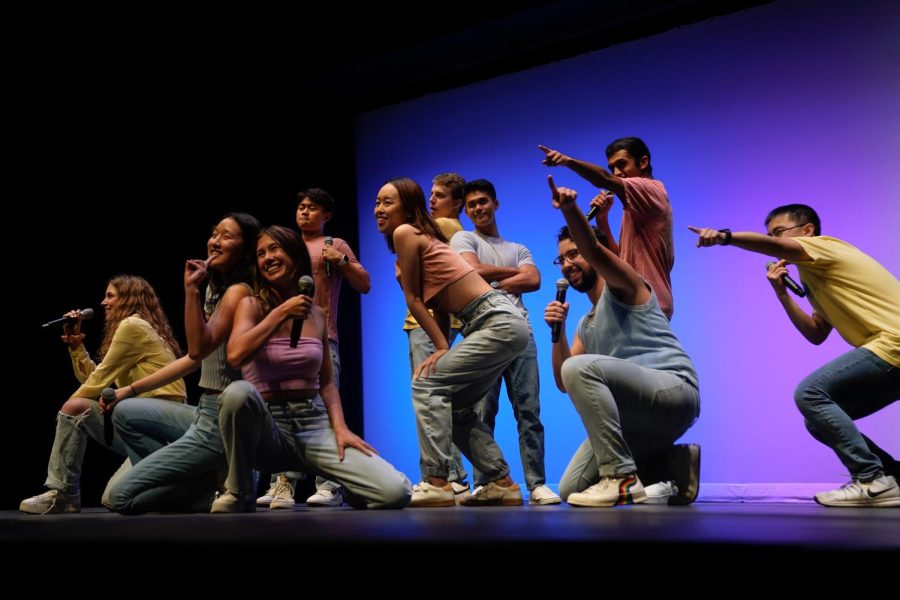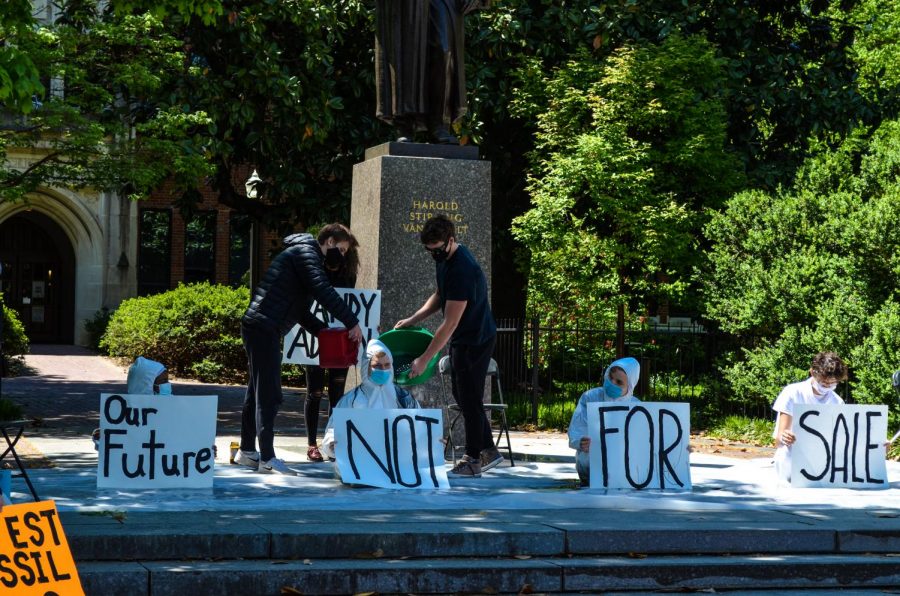On Monday, July 6, the U.S. Immigration and Customs Enforcement (ICE) released updated guidelines for international students on F-1 (academic study) visas at U.S. colleges and universities this fall.
Students at fully remote schools for the fall semester may not remain in the U.S. unless they transfer to a school with in-person instruction. This effectively reverses temporary exemptions which had allowed international students to remain in the U.S. through remote learning this spring. Moreover, if a school switches to fully remote learning anytime during the semester, international students will be required to leave the country immediately.
Students at fully in-person schools for the fall must attend in-person classes in order to retain their visa status. Students at schools that have declared a hybrid model—as Vanderbilt has done—must take at least one class in-person in order to retain their visa status.
“This announcement just made this hybrid model useless,” international student Kris Peng said in a message to The Hustler. “I believe the hybrid model is made mainly for international students who prefer or have to stay in their home country the next fall, but this announcement just made the hybrid model only useful for domestic students who want to stay at home.”
University Response to ICE Announcement
The International Student & Scholar Services (ISSS) emailed international students the next morning to acknowledge the ICE announcement.
“We are currently going through the guidance and identifying points of significance for Vanderbilt students as well as the information for which Vanderbilt, and schools in general, will need clarification from SEVP,” the email reads.
Later on July 7, around 7 p.m. CDT, Chancellor Daniel Diermeier and Provost Susan Wente released a joint statement criticizing the ICE guidance.
“We strongly oppose the guidance released by Immigration and Customs Enforcement yesterday pertaining to international students, which only sows further distress and uncertainty in a time of already tremendous upheaval,” the statement reads. “The impact will be devastating—on the lives of international students, on the ability of America’s top research universities to recruit the world’s best and brightest, and on our economy.”
Planned Amicus Brief for Harvard and MIT Lawsuit
Harvard University and the Massachusetts Institute of Technology filed a lawsuit against the Trump administration on July 8, claiming the proposed ICE policy was politically motivated and reckless.
According to senior international student Qi Wang, Vanderbilt plans to contribute an amicus brief—a document filed by a third party to provide relevant information to a case—to Harvard and MIT’s joint lawsuit against the Trump administration.
On July 9, Wang was forwarded an email from an Asian Studies faculty member with the subject line, “URGENT REQUEST FROM THE CHANCELLOR–TIME SENSITIVE TODAY.”
The email, originally sent to the Asian Studies Department by its chair, Gerald Figal, communicated a request from Dean of Graduate Education David Wright for examples of how the proposed ICE policy would harm international students. These examples would then be compiled in the amicus brief. The query spread through Instagram stories as Vanderbilt students shared screenshots of the email.
“Basically, if you have an example you feel would be powerful to include in the brief, please let us know and give us permission to use it,” Wright’s request stated. “We can do so without naming the student.”

International Student Response
Vanderbilt international students have generally expressed anger at the July 6 ICE announcement.
Peng, a sophomore international student from China, said that many Chinese international students she knows prefer to stay in China due to the rising number of COVID-19 cases in the U.S.
“Due to the travel ban, even if we, the Chinese students, want to come, it is nearly impossible for us to fly to the United States from China,” Peng said.
Carys Li, a rising sophomore and the president of the Vanderbilt University Chinese Students and Scholars Association (VUCSSA), said that ICE’s policy leaves no good option for international students—especially for students from countries on the CDC’s travel ban list, like China, Germany, Brazil and Iran.
“Say we wanna keep our student visa status active and choose to return to campus for ‘at least one in-person class.’ According to ICE, we would have to fly to a third country, stay there for at least 14 days, fly to the US, self-quarantine off campus, and find off-campus housing (because most of us were forced to choose remote study, thanks to Vandy, by 6/26, and hence lost our on-campus housing),” Li said in a message to The Hustler. “All of this has to happen in less than six months and at our own expenses.”
And if international students elect to study remotely, their F-1 visas will be deactivated, per the ICE update. Applying for a new visa and SEVIS record costs hundreds of dollars, Li said.
Plus, Li said, with the U.S. granting fewer visas to Chinese citizens, Chinese international students might not even be able to receive a new visa.
Other international students, like rising junior Jessica Huang, hope to see the university adapt so that international students can maintain their visa status while studying remotely. Columbia University, for example, has created “Go Local” programs for the fall semester to allow international students to take in-person classes within their home countries.
Wesley Wei, a senior domestic student, said he wants Vanderbilt to demonstrate that they care about the international student community.
“The university should be fiercely advocating for international students and coordinating between its offices (literally, every office should be paying attention) to be proactive in adapting to the government’s decision and thinking several steps in advance,” Wei said in a message to The Hustler.
Wei added that the university should allow students to change their intent to study remotely without any negative repercussions, as well as consider adding in-person components to each class so that every course can be classified as in-person.
July 6 Meeting with Administrators
The ICE announcement came just hours after a July 6 meeting between a coalition of student groups and 12 administrators.
Together with the Vanderbilt Student Government (VSG) and the Multicultural Leadership Council (MLC), international student representatives presented feedback from the two surveys released in late June. Dean of Students Mark Bandas, Senior Associate Dean for Undergraduate Education Cynthia Paschal, ISSS Interim Director Susie Archer and Dean of Undergraduate Education André Christie-Mizell were among those in virtual attendance.
Overall, the meeting was productive, according to Lucas Martim de Lima Portilho, a rising sophomore from Brazil and creator of the Evaluation of the Return to Campus Plan Survey.
Per Portilho, ISSS representatives in the meeting committed to making a central location of important information for international students, rather than relying on the Return to Campus website. In addition, ISSS would make resources available to students in varying time zones, Portilho said.
“With regards to academics, they already have implemented or are implementing measures that address some of our concerns,” Portilho said in a message to The Hustler. “An example they gave us is that classes with a large proportion of international students have been moved as early in the morning as possible to accommodate for time zone differences (so far, in Peabody).”
Though the student coalition was unable to address all of their demands within the limited scope of the meeting, Portilho said they hope to schedule a follow-up meeting in the coming weeks to discuss further concerns regarding financial aid and student services.
“Ultimately, I hope that this leads to better communication between the administration and us students,” Portilho said. “I know that I advocated to help them distribute information, with the hope that students can play a bigger role in making communication more effective and transparent.”













